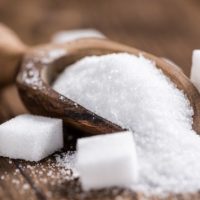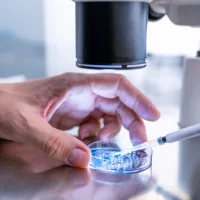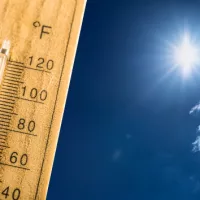
 HandmadePictures/iStock(NEW YORK) — Sugar is addicting — and science definitely agrees.
HandmadePictures/iStock(NEW YORK) — Sugar is addicting — and science definitely agrees.
That’s why decreasing your sugar intake or quitting it altogether can be very difficult.
Dr. Jennifer Ashton, ABC News’ chief medical correspondent, says sugar can be found in much of what we eat. Although it makes those products taste good, they can increase your sugar intake above recommended amounts.
“Read those labels,” Ashton said. “Turn everything that comes out of a package around and look at the sugar content.”
According to the World Health Organization, women should have 25 grams of sugar a day and men should have 37 grams of sugar a day. For children, it varies depending on age.
Ashton sat down with Good Morning America to share five approaches to beat sugar cravings:
Tip 1: Quit cold turkey
There is scientific and nutritional evidence to support the fact that sugar addiction is the same, in terms of the brain’s biochemistry, as addiction to cocaine, according to Ashton.
“How does one try to kick a cocaine habit? Cold turkey,” she said. “So you can try that with sugar — cold turkey.”
Tip 2: A slow taper
Slowly removing sweet foods and drinks from your diet might be an easier approach.
“If you feel as though you are out of control or moody without your first soft drink of the day, or until you have a piece of chocolate, you need to consider slowly draining your system from that need for sugar,” said Dr. Niket Sonpal, internist and gastroenterologist at Touro College of Osteopathic Medicine in New York City.
Sonpal said eating a piece of fruit is the best way to minimize your desire for sugar and recommends avoiding all processed sugars.
Tip 3: 5 Day/2 Day
The five-day, two-day approach is a way for people to look at their diet through a weekly lens.
In this strategy, you strictly avoid all added sugars from Monday through Friday. This means reading labels closely, avoiding sweet foods and drinks, and not adding sugar to your coffee or tea.
Once the weekend rolls around, people can relax the restrictions.
“Anything you do for five days is going to eventually have more of an impact than things you do for two days,” Ashton said. “You’ll start to lose weight because that is always a byproduct of cutting sugar.”
The weight loss from the five-day, two-day approach serves as positive reinforcement for people to continue doing it more. It can start off as the five-day, two-day approach and eventually build up to six days or seven days until eventually you start to lose your craving for sweet foods and drinks.
Tip 4: Don’t drink your calories
One drink that’s high in calories can make up that day’s sugar intake in no time.
Ashton recommends drinking calorie-free beverages such as water or seltzer. That doesn’t mean you can’t enjoy a summer cocktail or a glass of wine, but she said to be cautious about how many calories are in a drink and how many of those drinks you’re consuming.
It’s also important to rethink social behaviors that lead to drinking extra calories. Sonpal said many people have social rituals during the day to help de-stress from tasks and meetings such as going to a cafe with a coworker midday to get a sugary caffeinated iced drink. He recommends replacing that with something that is healthy and rewarding.
“Ask yourself a simple question before you eat or drink anything: What macro nutrient group does this belong to? Is it a protein? Is it a fat or is it a carb?” he said.
If the answer to that is carb, that means you are just ingesting more sugar.
Tip 5: It’s not one size fits all
What might work for one person could work differently for another. For this reason, Ashton said people should find an approach that works best for them.
In doing so, it’s important to be accountable to yourself. Pay close attention to what is being put in your body and how that’s affecting it.
“You owe yourself the opportunity to be as healthy and as happy as you can be,” Ashton said. “And if that means cutting sugar a little bit, go for it.”
Copyright © 2019, ABC Radio. All rights reserved.















